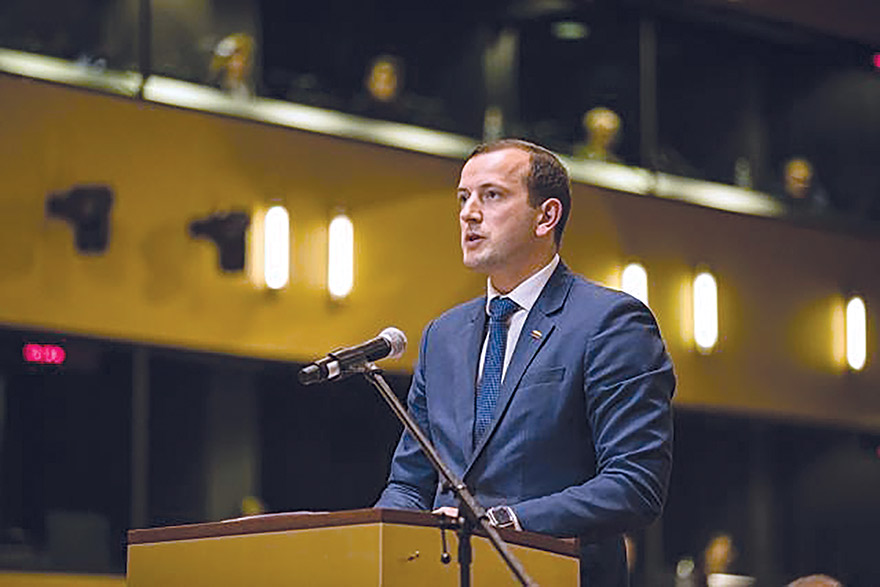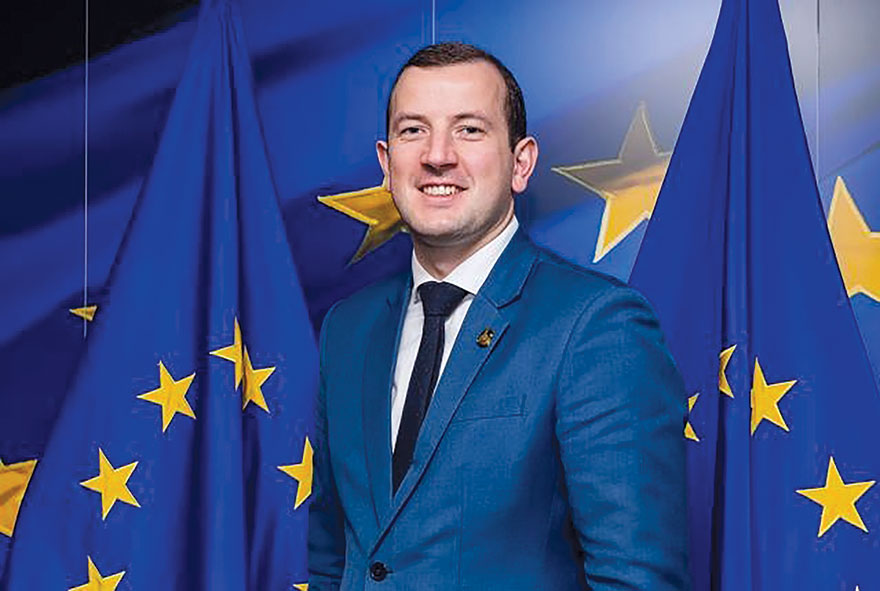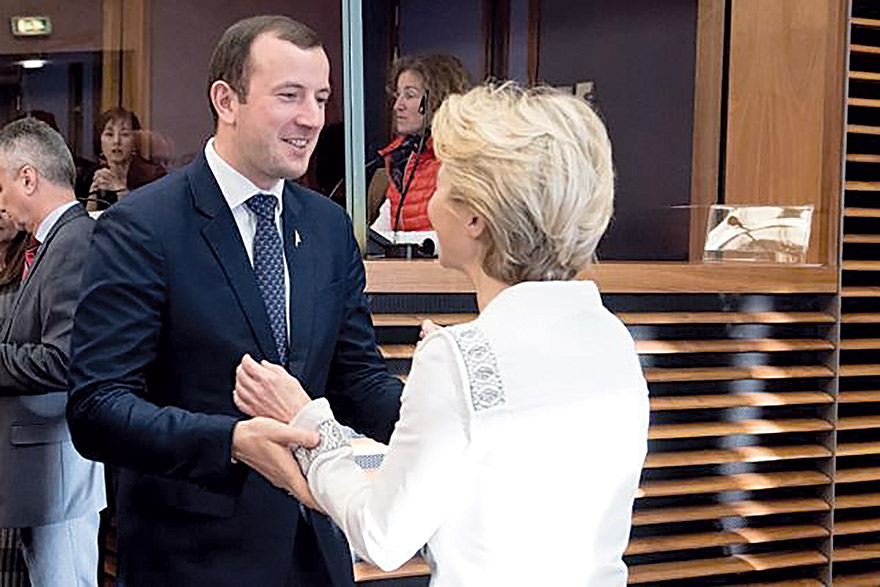When it comes to coal pollution, Western Balkans is part of Europe
“Coal pollution is a European problem and, as such, includes the Western Balkans. It is not an easy problem to solve, but we are fully committed to working with our partners in the region to succeed in the transition for the benefit of all European (EU and Western Balkan) citizens.”
Considering how many people across Europe are marching in the streets demanding bold action to counter climate change and pollution there’s no doubt that the mandate and the actions of Virginijus Sinkevičius, new European Commissioner for the Environment, Oceans & Fisheries, will be under strong public scrutiny. Furthermore, anyone who is informed about the position of European Commission President Ursula von der Leyen and her team knows that these issues are close to their hearts and political mission. In that respect, issues related to pollution, environmental protection, climate change and the circular economy by all means impact not just on EU members, but also the candidate countries, says Commissioner Sinkevičius in this interview for CorD.
You are the youngest ever European Commissioner, and – as one media title suggests – your position has huge responsibilities. Do you feel ready to rise to the occasion?
Politics is not about age, it’s about ideas and a team that’s eager to deliver. That was the key to us managing to achieve good results during my mandate as a minister back in Lithuania.
The portfolio of the Environment, Oceans and Fisheries is very meaningful to me, as it’s shaping my own future and my generation will have to live it. And I am determined to take on this challenge.
The necessary transition towards carbon-neutrality and zero-pollution is going to improve people’s wellbeing and make Europe more competitive
Considering President von der Leyen’s letter to you outlining your mission, how would you describe your priorities as they relate to global issues of climate change, reducing biodiversity and pollution?
One of the many good things about this new Commission is the way we are trying to tackle things not as isolated issues, but as integrated challenges. That will make an enormous difference. So instead of addressing climate change, biodiversity loss and pollution with merely sector-specific measures, we are working to ensure that the approach we take has knock-on benefits.

There are several reasons for that, but the main one is very simple – it’s simply wrong to think in terms of stand-alone problems here. The reality is that all these problems are interconnected and require solutions that work on several fronts at the same time. Climate change and biodiversity loss aren’t just interconnected – they make each other worse. But protecting biodiversity and restoring ecosystems is an excellent way of countering the effects of climate change. That goes for pollution too – we aren’t just talking about effects on human health, but also on biodiversity, so cutting pollution will give a direct boost to ecosystems, and that in turn will help fight the climate crisis.
I would firstly like to draw your attention to the topic of zero-pollution environments. This will require a wide-ranging approach and a number of measures and costs, both at the level of states and among businesses. How do you envisage the major steps in this regard?
If we want to achieve a toxic-free environment, as is the ambition of the European Green Deal, we will need to do more to prevent pollution from being generated in the first place. We also need to improve measures to monitor and report, to clean and remedy pollution from air, water, soil and consumer products. The EU and is member states will need to look more systematically at relevant policies and regulations.
The next milestones are clear. First, we will present a chemicals strategy for sustainability, aimed at creating a stronger framework that better protects from hazardous chemicals, reflects scientific evidence and increases global competitiveness. Then we aim to adopt a zero pollution action plan for air, water and soil, as well as a dedicated review of EU measures to address pollution from large industrial installations. For this we’ll be drawing on the results of policy evaluations that we’ve been carrying out. We will also look into aligning our policies with the latest scientific advice and with related policies. Think of climate, energy and the circular economy. And we will involve all parties in developing these actions, including EU member states, businesses and civil society. This is good Commission practise and is crucial to designing policies that can deliver on the ground.
There is no incompatibility between economic prosperity and sustainability, on the contrary the two go together
Many believe that tackling these issues will require a change in the way we think about GDP growth. How deep will your measures go?
There is no incompatibility between economic prosperity and sustainability, on the contrary the two go together. The Green Deal is an ambitious plan to cut emissions, protect biodiversity and achieve zero pollution, but it is also a new growth strategy that will create jobs, boost innovation and not leave anyone behind.
At the same time, the European Commission is well aware that GDP is not made to measure sustainability, well-being or fairness in society. This is why the Commission has been working on the provision of high-quality information that goes beyond GDP. Eurostat has published a set of quality of life indicators since 2015, and the Commission implemented the measurement of progress towards the 17 Sustainable Development Goals (SDG) of the 2030 United Nations Agenda using around 100 indicators relevant from an EU perspective. And under the auspices of the Finnish presidency, the Council adopted conclusions on the Economy of Wellbeing, promoting the fact that “people wellbeing” is a prerequisite for sustainable economic growth.
Will the EU’s policy regarding zero pollution impact on policies related to membership candidate countries?
Is coal pollution in the Western Balkans a European problem and how might it be tackled? Candidate countries and potential candidates have to align their policies and their environmental legislation with those of the EU. The EU has put in place an extensive system to combat air pollution, water pollution, waste and even indirect pollution stemming from our consumer habits.
We are now stepping up our ambition through the European Green Deal and our zeropollution ambition. We want to have even less pollution – we want to create a toxic-free environment by focusing on pollution prevention and cleaning up and remedying pollution where it already exists. All the regulatory measures that we enact to this end will be part of the body of legislation that candidate countries and potential candidates will align with.

The implementation of the EU environmental body of legislation is the first important step towards the zero-pollution ambition. Coal pollution is a European problem, in a Europe that includes the Western Balkans. In that sense, it is our common problem because pollution knows no borders. EU countries also suffer from coal pollution and this is not an easy problem to solve. The necessary transition towards carbon-neutrality and zero-pollution is going to improve people’s well-being and make Europe more competitive. But it will require more efforts from citizens, sectors and regions that rely more on fossil fuels – such as coal – than others.
We are fully committed to working with our partners in the region to succeed in the transition. The EU is also providing financial assistance to countries in the region to facilitate this transition for the benefit of all European (EU and Western Balkans) citizens.
People want changes as well, or they wouldn’t be marching the streets week after week, demanding stronger action on issues like biodiversity loss and climate change
Considering your previous work related to the economy and innovation, should we expect many of the answers in your current scope of work on the circular economy to come from start-ups and R&D activities?
I follow those files very carefully, of course, and if you want rapid change, you need young and flexible companies that aren’t afraid to shake the tree. Start-ups really shine in areas like that. And yes, innovation is one of the drivers of change and also forms the basis of any modern economy. Europe built its economy on innovation and change, and there is every reason to believe that that’s where the future lies as well.
That said, when it comes to the circular economy, one of the frustrating things about the slow pace of transition is the fact that we have so many good technologies that are already available. So the problem isn’t that they don’t exist, it’s that the political or business will isn’t yet there to produce them at scale. We’re locked into old technologies, and those vested interested are slowing the pace of change.
So that’s one area where we are looking very hard at the obstacles, and thinking about what we can do to speed things along.
A new Circular Economy Action Plan, which is in your portfolio, will be extended to new sectors, including IT, and will feed into the new industrial strategy. Could you briefly outline the kinds of changes we can expect?
It’s early days, and we are still fine tuning the details, but one of the main aims is to focus not just on IT, but on sectors that use a lot of resources, like textiles, construction and plastics. We need to ensure the swift transformation of these sectors into circular systems.
The intention is to build on the success to date of the Plastics Strategy, and steer plastics further towards circularity. The plan will also tackle micro plastics, it will develop a regulatory framework for bioplastics and will implement the measures we planned on single-use plastics.
Behind all this is an ambition to avoid waste and emissions by supporting circular design and stepping up the sustainability and durability of products. We will also give consumers more power by ensuring they have better information about products and services. In that way we can see through green-washing claims.
The Green Deal is an ambitious plan to cut emissions, protect biodiversity and achieve zero pollution, but it is also a new growth strategy that will create jobs, boost innovation and not leave anyone behind
You are also responsible for policies related to farming. What would be your main contributions to the ‘Farm to Fork’ strategy on sustainable food?
“Farm to Fork” must be an overarching strategy that impacts on the entire food system. It must lead to transformative change not only in production, but also in transport, processing, packaging, retail and the consumption of food, taking into account how the EU food system affects, and is affected by, global linkages. I will work closely with my colleagues – Commissioner for Agriculture Janusz Wojciechowski and Commissioner for Health and Food Safety Stella Kyriakides – on the delivery of this task for ensuring that agriculture and food production will contribute to our climate, environmental and biodiversity goals.

Agriculture can have a huge negative impact on biodiversity. That’s whVirginijus Sinkevičiusy the future Common Agricultural Policy must ensure a higher level of ambition to address the climate and ecological crisis. The Commission will not accept a lowering of the environment and climate ambition of the new Common Agricultural Policy. Let’s be clear: if we want an agriculture that produces healthy food by healthy farmers for healthy people, we have to start – together with farmers – fundamentally transforming the agricultural model.
Pesticides are also a known factor of biodiversity loss, so I will push for ambitious targets to reduce pesticide use and risk. The overuse of chemicals and fertilisers must also be addressed as a major source of pressure on ecosystems, and should be replaced whenever possible. Promoting organic production, agro-ecology and agroforestry will contribute to a closer-to-nature agriculture. We cannot allow the ongoing decline of pollinators and other insects. I aim to ensure that we fully implement and strengthen the EU pollinators initiative in order to bring back our pollinators in a healthy population level.
Many of these issues obviously relate to global cooperation and cannot be addressed if other parties don’t welcome the same approach. Do you feel that the time is right for a global cooperation on these topics or not?
Absolutely. It’s obviously what people want as well, or they wouldn’t be marching the streets week after week, demanding stronger action on issues like biodiversity loss and climate change. I think there is no doubt that the momentum is growing.
One of my main objectives for this year is to help deliver a major new global strategy for the world’s nature at COP 15, the Convention on Biodiversity meeting to take place in Kunming, China this autumn. What we need is an ambitious global framework, the biodiversity equivalent of the Paris 1.5° goal, with long-term and short-term goals. We’ll be adopting a new EU biodiversity strategy to show that we can lead by example.
If you want cooperation, you need credibility. And that’s where we need to keep delivering – as we have on climate and plastics. Then others will follow.
How could citizens contribute to implementing the required changes? In that respect, what would be your main message to EU citizens and citizens of EU membership candidate countries?
I think citizens know what to do – they know they have to be the change that they want to see. So many young people are already doing that, in so many ways – thinking about the sustainability of the things they buy, about their impact on biodiversity, about how their own behaviour impacts on the world we share. They are my inspiration and I’m determined to live up to their expectations.
| CONVICTION
The portfolio I am responsible for is very meaningful to me, as it’s shaping my own future and my generation will have to live it. And I am determined take on this challenge |
STRATEGY
The new Commission is trying to tackle climate change, biodiversity loss and pollution as integrated challenges. Such an approach will make an enormous difference |
CHALLENGE
We’re locked into old technologies and those vested interested are slowing the pace of transition to the circular economy |
|---|